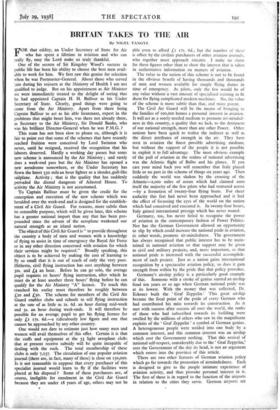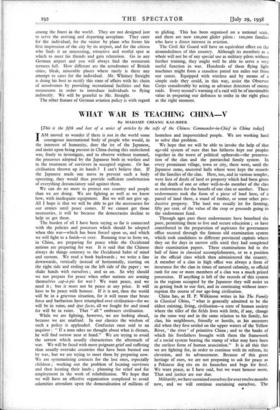BRITAIN TAKES TO THE AIR
By NIGEL TANGYE
FOR that oddity, an Under Secretary of State for Air who has spent a lifetime in aviation and who can really fly, may the Lord make us truly thankful.
One of the secrets of Sir Kingsley Wood's success in public life has been his ability to choose the best men avail- able to work for him. We first saw this genius for selection when he was Postmaster-General. About those who served -Aim during his sojourn at the Ministry of Health I am not qualified to judge. But on his appointment as Air Minister we were immediately treated to the delight of seeing that he had appointed Captain H. H. Balfour as his Under Secretary of State. Clearly, good things were going to come from the Air Ministry. Apart from there being Captain Balfour to act as his able lieutenant, expert in the problems that might beset him, was there not already there, as Secretary to the Air Ministry, Sir Donald Banks, who was his brilliant Director-General when he was P.M.G. ?
This team has not been slow to please us, although it is fair to point out that some of the schemes that have recently reached fruition were conceived by Lord Swinton who never, until he resigned, received the recognition that his labours deserved. Hardly a working day passes but some new scheme is announced by the Air Ministry ; and rarely does a week-end pass but the Air Minister has opened a new aerodrome somewhere, or the Under Secretary has flown the latest 35o mile an hour fighter or a slender, gull-like sailplane. Activity ; that is the quality that has suddenly pervaded the dismal dungeons of Adastral House. To activity the Air Ministry is not accustomed.
To 'Captain Balfour must be given the• credit for the conception and execution of the new scheme which was heralded over the week-end and is designed for the establish- ment of a Civil Air Guard. For reasons, more subtle than its ostensible purpose, which will be given later, this scheme has a greater national import than any that has been pro- pounded since the advent of the aeroplane weakened our natural strength as an island nation.
The object of this Civil Air Guard is " to provide throughout the country a body of men and women with a knowledge of flying to assist in time of emergency the Royal Air Force or in any other direction concerned with aviation for which their services might be required." Broadly speaking, this object is to be achieved by making the cost of learning to fly so small that it is out of reach of only the very poor. Hitherto, civil flying instruction has cost anything between 3os. and £4 an hour. Before he can go solo, the average pupil requires io hours' flying instruction, after which he must do at least another three hours' flying before he can qualify for the Air Ministry "A" licence. To reach this standard his outlay must therefore be roughly between £20 and £50. The scheme for members of the Civil Air Guard enables clubs and schools to sell flying instruction at the rate of as little as 2s. 6d. an hour during mid-week and 5s. an hour during week-ends. It will therefore be possible for an average, pupil to get his flying licence for only £r us. 6d.—a ridiculously low figure and one that cannot be approached by any other country.
One would not dare to estimate just how many men and women will avail themselves of this offer. Certain it is that the staffs and equipment at the 53 light aeroplane clubs that at present receive subsidy will be quite incapable of dealing with the rush. The total membership of these clubs is only 7,157. The circulation of one popular aviation journal (there are, in fact, many of these) is close on 150,000. Is it not reasonable to suppose that every purchaser of this specialist journal would learn to fly if the facilities were placed at his disposal ? Some of these purchasers are, of course, ineligible for enrolment in the Civil Air Guard because they are under 18 years of age, others may not be able even to afford £r 17s. 6d., but the number of these is offset by the civilian purchasers of other aviation journals, who together must approach ioo,000. I make no claim for these figures other than to show the interest that is taken in authoritative information on matters of aviation.
The value to the nation of this scheme is not to be found in the obvious benefit of having thousands and thousands of men and women available for simple flying duties in time of emergency. As pilots, only the few would be of any value without a vast amount of specialised training to fit them for flying complicated modern machines. No, the value of the scheme is more subtle than that, and more potent.
The Civil Air Guard will be the means of bringing to the families of mop:* homes a personal interest in aviation. It will act as a sorely needed medium to promote air-minded- ness in this country, a quality that we lack, to the detriment of our national strength, more than any other Power. Other nations have been quick to realise the indirect as well as the direct attributes of strength in the air. They have seen in aviation the finest possible advertising medium, but without the support of the people it is not possible to exploit it to full advantage. The most obvious example of the pull of aviation in the realms of national advertising was the Atlantic flight of Balbo and his planes. If you cast your mind back you will remember that Italy played little or no part in the scheme of things six years ago. Then suddenly the world was shaken by the crossing of. the Atlantic-2,000 miles of ocean which had claimed unto itself the majority of the few pilots who had ventured across —by a formation of twenty-four flying boats. For sheer audacity this feat had never been approached and it had the effect of focussing the eyes of the world on the nation which had conceived and executed it. In twenty-four hours, Italy gained international prestige which has never waned.
Germany, too, has never failed to recognise the power of aviation in the contemporary fashion of Power Politics. Nor has the German Government allowed an opportunity to slip by which could increase the national pride in aviation, in other words, promote air-mindedness. The government has always recognised that public interest has to be main- tained in national aviation so that support may be given to civil and military projects, and, more important, so that national pride is increased with the successful accomplish- ment of each project. just as a nation gains international recognition by a spectacular aviation policy, so does it gain strength from within by the pride that that policy provokes.
Germany's airship policy is a particularly good example of this. Someone with a stroke of genius started an airship fund ten years or so ago when German national pride was at its lowest. With the money that was collected, Dr. Eckener built the ' Graf Zeppelin.' This great airship became the focal point of the pride of every German who had contributed his mite towards its construction. As it met with success after success all over the world, the ranks of those who had subscribed towards its building were swelled by the millions of others who saw in the magnificent exploits of the ' Graf Zeppelin' a symbol of German genius. A heterogeneous people were welded into one body by a common interest, and this common interest was an airship which cost the Government nothing. That this revival of national self-respect, considerably due to the ' Graf Zeppelin,' cost the Government of the day its head, is not an argument which enters into the province of this article.
There are two other features of German aviation policy which go far towards the promotion of airmindedness. Each is designed to give to the people intimate experience of aviation activity, and thus provoke personal interest in it. The first of these is in regard to the function of the airports in relation to the cities they serve. German airports arc among the finest in the world. They are not designed just to serve the arriving and departing aeroplane. They cater for the individual, for the visitor by plane who forms his first impression of the city by its airport, and for the citizen who finds it an interesting, attractive and restful spot at which to meet his friends and gain relaxation.- Go to any German airport and you will always find the restaurant terraces full. How different are the aerodromes of British cities, bleak, miserable places where rarely is there any attempt to cater for the individual. Mr. Whitney Straight is doing his best to rectify this state of affairs with his chain of aerodromes by providing recreational facilities and fine restaurants in order to introduce individuals to flying indirectly. We will be grateful to Mr. Straight.
The other feature of German aviation policy is with regard to gliding. This has been organised on a national scale, and there are now too,000 glider pilots : too,000 families who have a direct interest in aviation.
The Civil Air Guard will have an equivalent effect on the airmindedness of this country. Although its members as a whole will not be of any special use as military pilots without further training, they might well be able to serve a very useful function in war. Hundreds of them flying light machines might form a ceaseless patrol ten miles out from our coasts. Equipped with wireless and by means of a simple code they could, in this way, assist the Observer Corps considerably by acting as advance detectors of enemy raids. Every second's warning of a raid will be of inestimable value in preparing our defences to strike in the right place at the right moment.



































 Previous page
Previous page